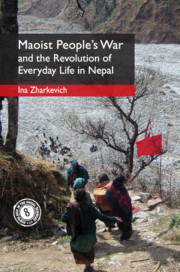Book contents
- Frontmatter
- Contents
- List of Figures
- Acknowledgements
- Glossary of Nepali Terms
- Introduction
- 1 Thabang: From Remote Village to Revolutionary Myth
- 2 The Moral Economy of War: The Making of the Base Area
- 3 Becoming Maoist in a Time of Insurgency
- 4 The Marital Economy of War: Reconfiguring Kinship Loyalties and Conjugality
- 5 Remaking the Tribe: ‘A Farewell to Bad Traditions’
- 6 Subverting the ‘Sacred Cow’: When Beef Becomes Edible
- 7 When All Castes Become One: Transgressing Caste Boundaries during War
- 8 When Gods Return to Their Homeland in the Himalayas: Maoism, Religion, and Change
- Conclusion
- Appendices
- Bibliography
- Index
7 - When All Castes Become One: Transgressing Caste Boundaries during War
Published online by Cambridge University Press: 28 March 2019
- Frontmatter
- Contents
- List of Figures
- Acknowledgements
- Glossary of Nepali Terms
- Introduction
- 1 Thabang: From Remote Village to Revolutionary Myth
- 2 The Moral Economy of War: The Making of the Base Area
- 3 Becoming Maoist in a Time of Insurgency
- 4 The Marital Economy of War: Reconfiguring Kinship Loyalties and Conjugality
- 5 Remaking the Tribe: ‘A Farewell to Bad Traditions’
- 6 Subverting the ‘Sacred Cow’: When Beef Becomes Edible
- 7 When All Castes Become One: Transgressing Caste Boundaries during War
- 8 When Gods Return to Their Homeland in the Himalayas: Maoism, Religion, and Change
- Conclusion
- Appendices
- Bibliography
- Index
Summary
On an April morning in 2016, I came to have food with my host family in the village at the time. Even though usually the kitchen was full of life—animated by the laughter of children, the vocal speeches of Guras, the female head of the household, and the jovial conversations of her brothers—this time Mago, Guras’ eldest maternal aunt, was the only one sitting by the hearth, stirring daal. In her mid-seventies and quite frail, Mago had come to live with her niece and nephews after an argument with her daughter-in-law. She was married to the most knowledgeable and respected jaisi (astrologer and traditional healer) in the village. On leaving her home and coming to the house of her niece and nephews, Mago entered an entirely different universe, for her nephews were among the most respected and committed Maoist youth in the village, while their father had been one of the key people in the Maoist people's government during the war.
As Mago cooked the morning meal, she told me about the feast of momos (dumplings) the day before: with more than 600 dumplings prepared and shared between the neighbours and kin, close and distant, the feast turned into a festive occasion, especially so because momos have never been a staple in the village. However, despite the aura of liveliness and joyfulness that the feast entailed, Mago was rather sad, because ‘Kami-Damai’ (the term still widely used in the village to refer to castes previously known as untouchable) sat near the hearth and touched it, eating and serving food on par with Kham Magars. Mago noted that not being able to protest and having to comply with the norms in her niece's household, she simply sat in the corridor in front of the kitchen and did the dishes, preferring to avoid the conviviality of the feast and its attendees, who paid no heed to traditional inter-caste prohibitions. Mago's story finally explained to me why over the last couple of days the elderly woman, who used to sit with dignity at the very heart of the hearth in the beginning of my stay, had shifted to eating outside, in the corridor where dishes were often washed and where a big bushy shepherd dog was fed.
- Type
- Chapter
- Information
- Maoist People's War and the Revolution of Everyday Life in Nepal , pp. 209 - 229Publisher: Cambridge University PressPrint publication year: 2019



